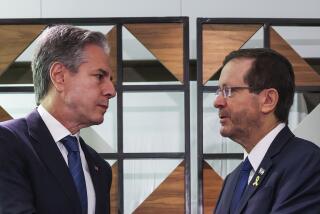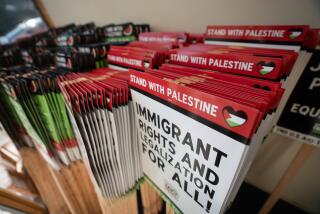Palestinian Raises Idea of a Truce : Editor May Propose a Moratorium on Attacking Israel
JERUSALEM — Hanna Seniora, an East Jerusalem newspaper editor who has been proposed as a possible Palestinian negotiator in preliminary Arab-American talks on Middle East peace, said Monday that he may propose a moratorium on further attacks against Israel to encourage the peace process.
His comments came as the State Department announced that Richard W. Murphy, assistant secretary for Near Eastern and South Asian affairs, will leave shortly for talks in Jordan, Egypt and Israel.
A State Department official said no decision has been made on whether Murphy will meet with any joint Jordanian-Palestinian delegation but added that the list of Palestinians whose names have been proposed as members of such a delegation will be among the matters Murphy will discuss with regional leaders.
Jordan’s King Hussein has proposed that the United States meet with an Arab delegation as the first step in a peace plan.
Some Progress Needed
Speaking to the Foreign Press Assn. in Jerusalem, Seniora, editor of the Arabic-language daily Al Fajr, said that if the preliminary Arab-American talks show promise, he will propose to the Palestinian leadership that attacks against Israel be suspended to pave the way for an international peace conference on the Mideast.
“I think we have to try to reach the Israeli public, and something like this might also help stop the radicalization of the Israeli public,” Seniora said in an interview afterward. “It might really touch the hearts of Israelis more than any other statement the Palestinians might come up with.”
Seniora, who said he will leave today for Amman, said he expects discussions with Americans to begin in the Jordanian capital by the end of the month.
Seniora was one of two Palestinian Arabs from the Israeli-occupied West Bank and Gaza Strip to be included on a list of seven that King Hussein’s government sent to Washington as candidates for the proposed Palestinian-Jordanian delegation. Fayez abu Rahmeh, a Gaza lawyer whose name is also on the list, left for Amman a week ago.
Yasser Arafat, chairman of the Palestine Liberation Organization, had drawn up a list of 22 possible Palestinian delegates. The list was reduced to seven by Hussein before it was sent on to Washington.
Too Close to PLO
The United States has indicated that Seniora and Abu Rahmeh are acceptable, but it has objected to the others on the list as being too closely identified with the PLO. Hussein was then asked to offer additional names, but he replied that he could not improve on the original list.
However, Seniora said Monday, there are indications that two other members on the list are acceptable to the Americans, “so I expect that before the end of this month we might see a meeting in Amman between the joint delegation and the Americans.”
He identified them as Nabil Shaat, a PLO representative in Cairo and a member of the Palestine National Council, the PLO’s so-called parliament in exile. Shaat is considered an expert on the Camp David agreements that led to peace between Egypt and Israel. The second is Mohammed Sabih, secretary of the Palestine National Council.
Israel is opposed to two-party Arab-American talks, particularly if such talks involve Palestinians closely identified with the PLO. It holds that only direct negotiations involving Israel, Jordan and non-PLO Palestinians can lead to peace.
Some Israeli officials have said they would consider even informal talks between Murphy and most of the proposed delegation members to be a violation of Washington’s 1974 pledge not to negotiate with the PLO.
U.S. Wants to Proceed
However, the Reagan Administration reportedly feels committed to King Hussein to go ahead with exploratory talks as long as they do not involve top PLO figures and with the understanding that the goal is direct Arab-Israeli talks at a future stage. And Washington has stressed that Israel will have no veto over proposed delegates that the Americans find acceptable.
Neither Jordan nor the Palestinians have made any secret of the fact that their goal in pushing the joint delegation idea is to win U.S. recognition of the PLO. The suggestion is that in return, the PLO would accept U.N. Resolution 242, which implicitly recognizes Israel’s right to exist as a nation and within secure borders.
“Our role is to make it possible for the PLO to be directly involved,” Seniora said Monday of the proposed joint Arab delegation.
“The Palestinian side thinks normalization of relations with the U.S. will put pressure on Israel and make the PLO more acceptable to the Israeli public and able to conduct negotiations with (Israeli Prime Minister Shimon) Peres.”
Pharmacy Graduate
Seniora, 48, is a native of Jerusalem. He studied in the United States in the 1950s and graduated as a pharmacist from a university in India.
He has been politically active since the early 1960s, and his newspaper is considered strongly pro-Arafat. In the 1970s, he was among those West Bank Palestinians who opposed association with Jordan, he said--adding, however, that he is now among those whose attitude has “mellowed because of the realization that if we are to have a political solution, the best possibility is an arrangement with Jordan.”
Seniora said he favors confederation between Jordan and a Palestinian state and that such a confederation could ultimately “attract other Arab states.” He said he hopes to see in his lifetime a “United States of Araby” governed by a confederal parliament.
Israel could not be a member, he said, but “maybe Israel can be in the common market with us.”
More to Read
Sign up for Essential California
The most important California stories and recommendations in your inbox every morning.
You may occasionally receive promotional content from the Los Angeles Times.










